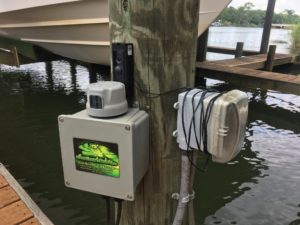Bayou Texar project recruited residents for watershed monitoring
Published 5.2.23
Florida Institute for Human and Machine Cognition research also includes small scale efforts in local efforts.
One such example is work by IHMC Research Scientist David Fries, who is using Bayou Texar as a test bed for a project to enlist residents in tracking the bayou’s health. It is a timely project that complements ongoing efforts to improve the waterway, which includes a nearly $6 million grant, announced by the City of Pensacola in November 2022.

A data monitoring box as part of the Smart Waterways project.
With two grants totaling $100,000 from the Pensacola & Perdido Bays Estuary Program Community Grant Program, Fries launched a citizen science initiative with six monitoring stations linking augmented- and virtual-reality technologies with the real-world bayou. The effort aims to build a living map of the health of one of Pensacola’s signature waterways.
“The goal is to enable a water management information system, generated by the people, working with machines to better understand nature and to monitor and effect a change in the waterway,” Fries said.
Fries recruited homeowners to attach data collection devices to their docks and property lines. Those devices feed into software to analyze the data collected. It includes:
- Photos and social sharing for citizens to share photos of wildlife, water conditions, query experts about what they’ve seen.
- Measurements citizens take to track the health of the water.
- Access to a data-rich online community that includes GIS mapping data, water quality data, and a place to share personal stories about what the bayou means to its fans.
Matt Posner, executive director of the Pensacola & Perdido Bays Estuary Program, said the capabilities this initiative offers made a compelling case for support.
“The grant committee really liked that it was looking to pilot a new frontier of how we collect water quality data and how we report it to the community,” Posner said. “The more you can get citizens engaged in science, the more they take ownership of the issues and opportunities in our estuaries, the better opportunity we have to address these issues.”
Fries says he hopes the effort successfully taps into the love people have for the bayou — and gives them a chance to channel that into action. Posner looks forward to being able to continue the collaboration, and ultimately roll out the system more widely.
IHMC is a not-for-profit research institute of the Florida University System where researchers pioneer science and technology aimed at leveraging and extending human capabilities. IHMC researchers and staff collaborate extensively with the government, industry and academia to help develop breakthrough technologies. IHMC research partners have included: DARPA, the National Science Foundation, NASA, Army, Navy, Air Force, National Institutes of Health, IBM, Microsoft, Honda, Boeing, Lockheed, and many others.
Latest News
- David Bear joins IHMC Board of Directors
- STEM-Talk: Michael Schmidt on building a space-faring civilization
- Florida Blue award supports health and wellness research and outreach at IHMC
- STEM-Talk: Ken Forbus on AI and his development of the Structure Mapping Engine
- STEM-Talk: Pascal Lee on returning to the Moon — and heading to Mars
- Aging Symposium draws experts to IHMC
- IHMC hosts Fredric G. Levin Lung Care Symposium March 27-28 in Pensacola
- Humanoid robotics and exoskeletons lead latest IHMC newsletter
- Celebrate Robotics Week at IHMC Open House on April 11, 2025

